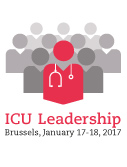ICU Management & Practice, Volume 16 - Issue 4, 2016

A course for aspiring and practising intensive care unit (ICU) leaders will take place in Brussels in January 2017. ICU Management & Practice spoke to some of the faculty, which includes Editor-in-Chief, Prof. Jean-Louis Vincent, to find out more.
Who is the course for?
This course will attract participants from a variety of backgrounds and experience, including young, motivated doctors who see themselves moving forward in their chosen careers as intensivists into positions of leadership in the near (or more distant) future, through to more experienced physicians, who are perhaps already in leadership roles, but want to enhance their leadership skills and ability to get the most from their ICU teams, and eventually to improve their ICU outcomes. As an interactive course, there will be lots of time for questions, debate and discussion. Small group sessions with members of the experienced faculty will also be employed to enhance the learning experience.
Why do we need leadership skills?
Good leadership is essential for all aspects of the ICU. Quality of care, safety, research, teaching and work atmosphere are all dependent on leadership. This course aims to provide participants with techniques and strategies to help them become effective, quality leaders, which will have long-reaching impact beyond their personal daily management challenges through to the ICU team as a whole and to patients and their families. Value-based ICU leadership will also help encourage more (young) doctors and other members of the ICU team, for example, nurses, into the profession, which is much needed as the demand for intensive care continues to expand.
The Faculty
The course chairmen are Prof. Jean-Louis Vincent (Brussels, Belgium) and Prof. Paul Barach (Detroit, USA). The faculty members are Professors Jacques Creteur (Brussels, Belgium), Bertrand Guidet (Paris, France), Michael Quintel (Göttingen, Germany), Jukka Takala (Bern, Switzerland) and Hans van der Hoeven (Nijmegen, the Netherlands).
Do you wish you had had access to such a course when you were starting out in intensive care?
Jean-Louis Vincent (JLV): Yes, as nobody tells us these things when we are starting out, and it is so important.
Paul Barach (PB): I believe passionately that this course would have given me the competencies—knowledge, skills and attitudes—needed to manage and lead patients and ICU care towards creating reliable, safe and high quality patient-centred outcomes. I also feel the course would have prepared me to be a better listener to my patients, colleagues and ICU team members.
Jacques Creteur (JC): Our medical training doesn’t include any teaching of leadership skills or human resource management. Yet good intensive care can only be achieved by good teamwork, and good team leadership will therefore result in better overall patient care.
Jukka Takala (JT): When starting my career in the late 1970s and early 1980s, leadership challenges were very different and focused on patient care, teaching, and research. The challenges today are much more complex, covering in addition also management, health economics and societal issues
With the benefit of hindsight, what would you tell your younger self, starting out as an ICU leader?
PB: With age and 20 years of clinical, research and administrative experience, comes an understanding that most is not often taught in medical schools or postgraduate residency programmes—the true value of building strong and authentic relationships, the real definition of servant leadership, the impact trust can have on your patients/colleagues/managers, and the role of careful and smart risk-taking can play in the trajectory of your careers.
JC: The real strength of a department of intensive care lies in its staff. We need to keep all staff members enthusiastic, committed and happy. This is the first challenge for a director and probably the most complex...
BG: In France we are fortunate to have this specific training. I would tell my younger self that the critical care speciality is the best for three reasons, which we need to keep in mind—diagnostic skills, procedural expertise and ethical issues.
JT: Understanding the role of intensive care in the broader picture of acute care specifically and healthcare in general helps to make priorities in patient care, resource allocation and leadership—follow-up of patient oriented outcomes, resource use, and quality are essential components of ICU-leadership.
Further
Information & Booking
Véronique De Vlaeminck
Erasme University Hospital
Route de Lennik 808 – B-1070 Brussels






